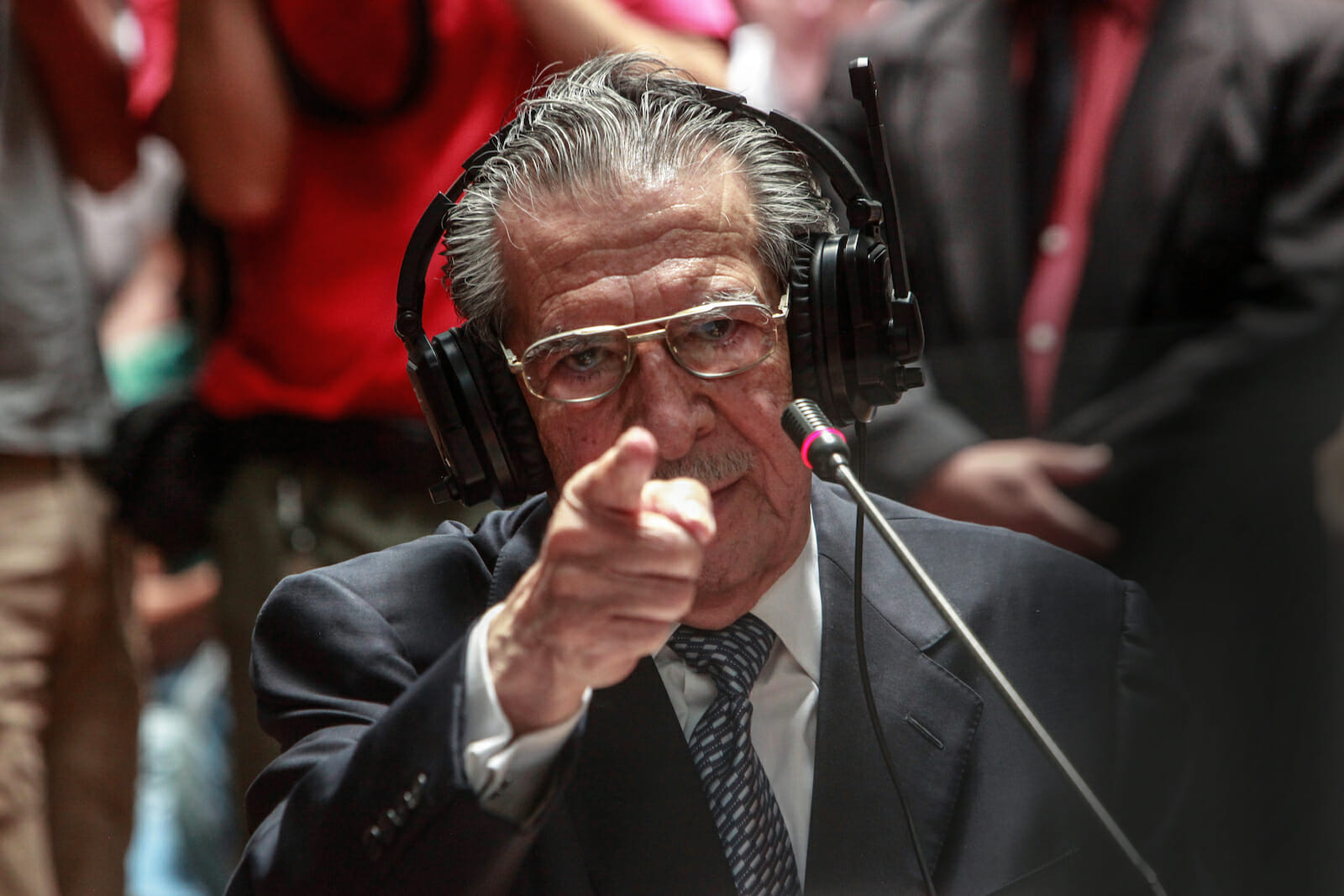
Justice Delayed: Efraín Ríos Montt trial Suspended
Truth commissions are implemented in countries where the judicial system has been tainted by corruption and malfeasance, typically to find ways to defend or justify the perpetrators of human rights abuses. The recent decision to suspend the trial of Efraín Ríos Montt in Guatemala City illustrates the weakness and susceptibility of Guatemala’s judicial system. Guatemala’s progression toward truth and reconciliation began during the 1994 Oslo Accords with the formation of the Historical Clarification Commission. The internationally sponsored commission was created to investigate human rights violations that occurred throughout the 36-year conflict. Its resulting evidence, based upon domestic and international documents, illustrated the state’s devastating assault on the country’s rural, primarily Mayan, communities.
After a five-year investigation, the commission found “that human rights violations caused by state repression were repeated, and…were…especially severe from 1978 to 1984.” Moreover, it was found that the bloodiest period of the civil war occurred “between 1981 and 1983,” where the military, commanded by then-President Efraín Ríos Montt, willingly “committed acts of genocide against groups of Mayan people.”
The period of violence was defined by the Montt regime’s counter-insurgency operation – Operation Sofia. The campaign was “inspired by the National Security Doctrine” and perpetrated under the auspices that the country’s rural communities were “natural allies of the [leftist] guerillas.” Directives implemented by military commanders “defined [the] concept of internal enemy…to include civilians from specific ethnic groups.”
“Massacres” defined the operation conducted by the Guatemalan military, and these policies “as planned by the State, resulted in the complete extermination of many Mayan communities.” The atrocities committed against the people of Guatemala were hidden from the world’s view under the guise that the country’s government was fighting against the threat of communist expansion.
When evidence of genocide began coming to light in the 1980s, many international leaders believed the charges were unfairly leveled against the successive regimes, leading US President Ronald Reagan to declare that Efraín Ríos Montt had received a “bum rap” for his efforts.
The international community’s, particularly the US’, assistance to and defense of Guatemala’s military dictatorships undermined their potential influence in the state’s eventual progression toward truth and reconciliation. It was the Western world’s infatuation with fighting a hypothetical communist expansion and unwavering defense of capitalism that led to the destruction of the Guatemalan state.
Path to Destruction
The crimes perpetrated throughout the decades-long civil war were, in part, a result of neo-liberal expansionism; a socio-political, -economic, and –cultural shift that exacerbated national tensions and led to ultra-nationalistic and ethnic ideologies to envelope the country’s institutions.
Guatemala’s political tide began changing in 1944 when the dictatorial government of Jorge Ubico was overthrown in the October Revolution, replaced by the democratically elected Juan Arevalo. The transition from dictatorship to democracy stemmed from the people’s desire to live under the same virtues they helped define in World War II. As Laura Moye stated in “The Intervention in Guatemala,” the Guatemalan people “participated in a war that was to make the world ‘safe for democracy,’ and now they felt entitled to democracy of their own.”
Under the Arevalo administration, the country’s national institutions transformed and became increasingly focused on civic, education, and government improvements to address the country’s widespread economic and social problems. The successive administration, led by Jacabo Arbenz Guzman, continued Guatemala’s transformation and initiated a series of land reforms that redistributed property to the people, angering the nation’s upper-class who saw their power and supremacy erode away.
Prior to the reforms, a majority of the country’s arable land was owned by an elite minority and foreign businesses; an important asset for a nation where political and economic power was defined by the agricultural industry. Guzman’s administration, as explained by Patrice McSherry’s “Review Essay” “Challenges to U.S. Hegemony in Latin America,” was focused on establishing “an independent development path…that would break the stranglehold of UFCO [the United Fruit Company] in Guatemala’s economic and political affairs.”
UFCO was heavily affected by the land reforms because it owned nearly two-thirds of Guatemala’s arable soil, and its influence forced the nation to “remain focus[ed] on the export of cash crops, rather than on food production for its own people.” Alterations to Guatemala’s domestic policies – measures implemented as a means of compensated nationalism – led UFCO to use its influence in the US government to have the reformation deemed a socialist initiative by the Eisenhower administration, who became convinced Guatemala was becoming a Soviet beachhead in the Western hemisphere.
The situation led the US to interfere in Guatemala’s domestic issues, initiating a series of operations under the Monroe and Truman Doctrines, believing it was ensuring its self-interest and self-preservation. After the US government decided to inject itself into the nation’s affairs, the democratically elected government was overthrown and all policies deleterious to foreign business and the wealthy minority were reversed. The result was the preservation of UFCOs land holdings and the re-introduction of dictatorial rule that dominated the country for nearly forty years, killing approximately 200,000 people.
In Pursuit of Justice
Since the civil war ended in 1996 and democratic institutions began replacing military strongmen, Guatemala needed to decide whether the policies set in place – providing immunity to past governments – to adhere to. Many in the new administrations did not believe justice could be obtained because of the military’s lingering influences, which was evident in Guatemala’s 2003 Presidential race. Guatemala’s fragile democracy feared institutional deterioration if justice was pursued for past crimes. For those in the country’s political leadership, truth and compensation to victims would be the only achievable solution, but perceptions began to transform when the Historical Clarification Commission became more involved in state matters.
When the commission was formed under the Oslo Accords, it was designed to usher in an era of accountability by investigating the murders and disappearances that occurred over the past four decades. Initially, however, it failed to convince the Guatemalan government and people of its purpose. Western influence in the way in which the commission was managed stalled its efforts. The international community’s past complicity in undermining Guatemala’s democratic order, as well as its assistance in committing the atrocities it was attempting to investigate, diminished national support.
A secondary issue that arose came from Guatemala’s political leadership. The progress made by the commission during its investigation diminished the national government’s image of strength and autonomy. Administrations wanted former military leaders to admit their roles in past events – rather than focusing on convicting only lower-ranking soldiers for past atrocities – but the judicial process proved too slow, expensive, and the government too separated from the situation it was attempting to address.
It was due to the procedural hurdles that a global approach was sought.
The commission’s investigation was introduced through criminal justice initiatives in a neo-Kantian pursuit to implement universal values. It had successfully uncovered numerous documents linking the Montt administration to past crimes, but many Guatemalans stated the process was insufficient and ineffective. Without a judicial proceeding following the investigation, the nation believed it had compromised justice for the sake of national unity – a perception incorrectly surmising truth as a pre-requisite for social reconstruction.
Progress Cut Short
The people’s disillusionment with the Historical Clarification Commission is not solely the result of the international community’s involvement. This commission – like so many before and after it – over-promised its results, which led the population to believe the past can be resolved without justice. When the reports failed to create action and the truth became revealed but nothing was reconciled, the country proceeded down a false path which stalled its ability to move forward.
Moving forward does not mean merely working through and explaining actions implemented by former regimes. It means proceeding with impartial measures to bring justice to past offenders and work toward a future of reconciliation and resolution. Truth commissions are a process and not a conclusion; they were never intended to be courts, which is the reason the judicial system needed to step in to move the country forward. Trying the past is necessary for national reconciliation because the government enters into a social compact with the victims, and, in turn, they become the agents needed to reform the societal order.
This author’s initial response to the Efraín Ríos Montt trial was that the prosecution illustrated a changing military perception. It also demonstrated that Guatemala was ready for closure, as long as the country recognizes it must not end the investigations here. The trial’s symbolism demonstrated the country’s renewing faith in the rule of law, a preliminary shift in the nation’s institutions to merge ethics with utilitarianism, and a means to illustrate how truth commissions can easily play a role in the greater concept of national democratization and modernization.
In the preliminary research, the initial inclination was that there was a very good chance the nation’s political and military leaders were using the trial to not only separate itself from the past but also divert attention away from their past crimes. When members of the country’s current leadership were implicated during the trial, it became increasingly apparent that the proceedings would be concluded without conviction. Recognizing that the current trial is merely suspended it can be ascertained that Guatemala’s political and military leaders will not be interested in publicizing other incidents from the country’s dark past, which means a re-start seems unlikely.
Even in democracies, the desire for a few to remain in power outweighs the interests of an entire nation. As the New York Times reported, “a group of former government officials published a statement in a local newspaper arguing that the genocide accusation was also directed ‘against the State of Guatemala in its entirety,’ and that a guilty verdict would ‘imply serious dangers for our country.’”
The country is ready to move forward, but those who continue to hold power are afraid of paying for their crimes. The judicial process was to be the first time a court charges a former leader with genocide. It was a means for a country to demand modernity by promoting change and seeking legitimization at home and abroad. The entire nation has, once again, fallen victim to a powerful few.

